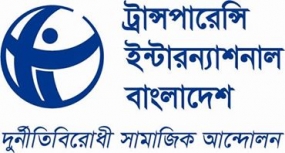
সচেতন নাগরিক কমিটি ,সনাক (টিআইবি), কুড়িগ্রাম এর তথ্য সমূহ
টিআইবি‘র মিশন ভিশন
টিআইবি‘র ভিশন
ট্রান্সপারেন্সি ইন্টারন্যাশনাল বাংলাদেশ (টিআইবি)এবটি স্বাধীন, দলীয় রাজনীতিমুক্ত অলাভজনক বেসরকারী প্রতিষ্ঠান। টিআইবি এমন এক বাংলাদেশ দেখতে চায় যেখানে সরকার, রাজণীতি, ব্যাবসা-বাণিজ্য, নাগরিক সমাজ ও সাধারণ মানুষের জীবন হবে দুর্নীতির প্রভাব থেকে মুক্ত।
টিআইবি‘র মিশন
দুর্নীতির বিরুদ্ধে একটি জোরালো সামাজিক আন্দোলন গড়ে তুলতে টিআইবি সক্রিয়, যাতে সরকারি-বেসরকারি বিভিন্ন সংস্থা/প্রতিষ্ঠানে দুর্র্নীতি রোধ করা যায় এ্ং সেইসাথে আইনের শাসন প্রতিষ্ঠিত হয়।প্রশাসন,রাজণীতি, ব্যবসা-বাণিজ্যসহ দেশের সকল ক্ষেত্রে স্বচ্ছ এবং জবাবদিহিমূলক ক্যবস্থা যাতে গড়ে ওঠে সে লক্ষ্যেই টিআইবি কাজ করছে ।
Vision
Transparency International Bangladesh (TIB) is an independent, non-government, non-partisan and non-profit organization with a vision of Bangladesh in which government, politics, business, civil society and the daily lives of the people shall be free from corruption.
In the context of the international movement against corruption, as the fully accredited national chapter in Bangladesh of the Berlin-based Transparency International (TI), TIB partners and cooperates with TI and its chapters worldwide.
Values
TIB is committed to values of democracy, justice, rule of law, transparency, accountability, integrity and impartiality.
Mission
TIB's mission is to catalyze and strengthen a participatory social movement to promote and develop institutions, laws and practices for combating corruption in Bangladesh and establishing an efficient and transparent system of governance, politics and business.
The Context
Corruption is a key national challenge for Bangladesh. Corruption implies abuse of power for personal benefits. There is a close relationship between power and corruption, though not everyone in positions of power is involved in corruption.
However, those who engage themselves in corruption, abuse their power political, economic or social, within or outside Government for personal gain. Corruption is also a behavior or act that breaks away or contradicts from ethical and moral standard, laws and civic virtues. Corruption involves giving and seeking of favors, buying political influence, taking kickbacks, and bribes. Corruption may also include any or a combination of such acts as embezzlement, fraud, nepotism, negligence of duty, misuse of public or institutional fund and extortion.
Corruption is a menace that breeds and increases all forms of injustice, it accentuates poverty, prevents development, and undermines democracy and governance. It prevents rule of law, distorts market and stifles economic growth. Corruption creates and perpetuates social and economic deprivation and inequality. Corruption leads to violation of basic constitutional and human rights. It breeds crimes, social frustration and discontent. Corruption undermines the processes and structures that could be conducive to poverty reduction and promotion of human security.
Corruption is nothing new, nor is it peculiar to any particular context. It takes place in greater or lesser degree in all countries of the world, irrespective of political and economic system, big or small, developed or developing. However, in a developing country like Bangladesh its impacts are most unbearable. Corruption has become a key issue of public interest in Bangladesh not merely because of the annual Corruption Perceptions Index (CPI) published by Transparency International which has for the fifth successive year ranked Bangladesh at the bottom of the list, but more importantly because of the way corruption affects the lives of the common people. Irrespective of whether Bangladesh ranks at the bottom or higher in international comparison, there is a widespread public concern in the country about a pervasive presence of corruption. All the major political parties recognize corruption as a key national issue and almost invariably identify fighting corruption as a top electoral commitment.
Corruption must be fought comprehensively and strategically, combining both preventive and curative measures. Since the public sector is at the core of corruption and since corruption in the public sector is most unjustifiable and unbearable, it is incumbent upon the Government to lead the process. However, the people at large who are the ultimate source of power, have also a key role to play at both national and local levels to combat the menace by exerting pressure and demanding change, especially when the political will at the highest level is absent or not strong enough, and when the institutions of the national integrity system are not sufficiently effective.
It is in this context that TIB sees itself as a catalyst of social movement against corruption, a comprehensive drive to promote effective citizens awareness and participation as well as collaboration and partnership with all stakeholders, including the Government. The main task is to contribute to the creation of an environment in which corruption will be hated and rejected by everyone and the anti-corruption movement will gain stronger grounds at all levels of the state and society.
TIB's work is against corruption and its powerbase, not against the government, or any particular department or institution thereof, nor is it in TIB's mandate to investigate individual cases or allegations of corruption - big or small, local or national. TIB visualizes itself as a co-stakeholder and source of strength for all anti-corruption initiatives including the Government


